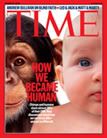Was Time Created?

Dr. Peter May has a fine article at bethinking.org titled, Has Science Disproved God? In it he fortifies the Cosmological argument with scientific discovery.
I do have one disagreement, though. In his article, Dr. May suggests that time is a created thing:
We cannot speak about time before time existed. God, if he created the universe, must live outside of space and time.
Time as the Movement of a Clock
For scientists such as Einstein or Hawking, time must be physical because their worldview rules-out the existence of abstract entities. Therefore, they ascribe a beginning to time and describe it as, basically, the movement of the hands of the clock.
Christians too typically fall into this line of reasoning when they speak of God being “outside of time.” Time is seen as a creation of God that will someday be done away with. Until then, He will content Himself with being a sort of jack-in-the-box, jumping in and out of this box called time.
Eternal Now?
Another Christian explanation of God and time, sometimes called “eternal now,” was held by many of our Church Fathers, including Clement of Alexandria, Tertullian, Origen, and Methodius.
This view puts God in a window overlooking a parade—the ever-present spectator, God is perched high-above, observing all events at once. Consequently, the creation of the earth, the crucifixion of Christ, and the consummation of the age are all happening at one time. As if all events were thrown into a cosmic Cuisinart.
Not only is there no hint of this in the Scriptures, there is, it seems to me, the problem of us experiencing something that God couldn’t, such as what it’s like to actually have a singular now, and what it’s like to have an experience of past events.
I heard someone say once that time is the stuff that keeps everything from happening at once. It seems that this would be true for God too.
Sequence
There is certainly a created aspect of time. But is it exclusively so? I don’t think believe it is. There seems to be an uncreated element that is a necessary consequence of God’s existence. Consider this: Time is usually defined as duration—that which passes between events. It seems to me that there is something else to consider: sequence, which includes the events themselves. Here’s what I mean:
There are two types of sequence: logical and temporal. An example of a logical sequence would be counting, 1, 2, 3, 4, etc. “2” logically follows “1.”
A temporal sequence would be a simple recounting of events. For example, if I numbered four popsicle sticks and then randomly laid them out, they might turnout like this: 4, 2, 1, 3. That’s a temporal sequence.
Temporality
Before God created the material universe there was a before. Before denotes a temporal sequence and is a hallmark of time. Therefore, since there was a before preceding the creation of the material universe, then time could not been part of that creation.
Here’s something else to consider: before that creation, God created a certain number of angles; and before He created them, He set a fixed number in His mind. This involves counting—logical sequences. Since God is not material, and since He is counting and creating, then neither logical nor temporal sequences are material; and since they necessarily precede his creative work, they themselves cannot be created; hence time cannot be material nor created.
Labels: Doctrine of Creation, Philosophy





